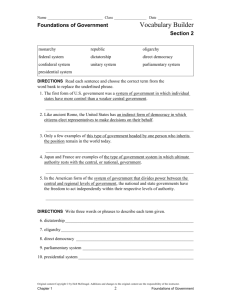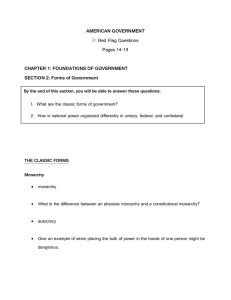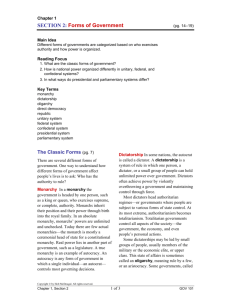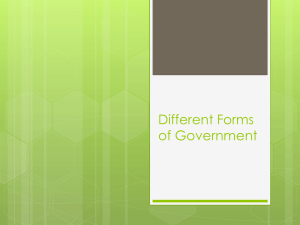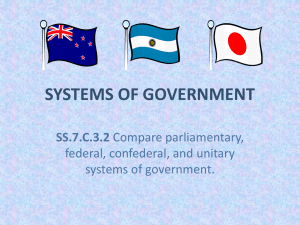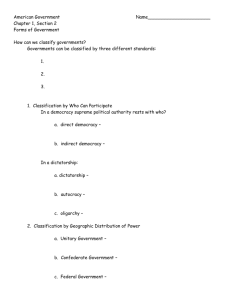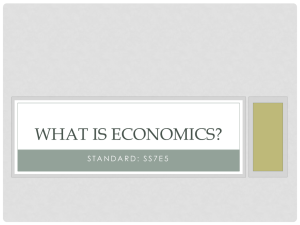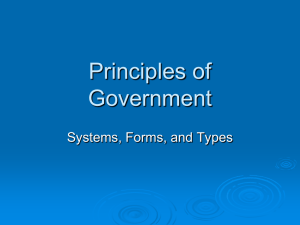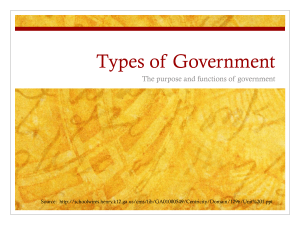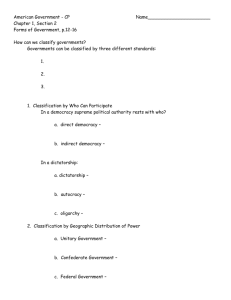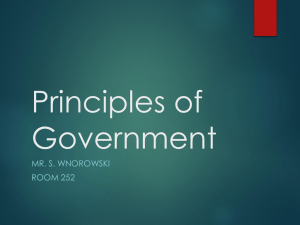Chp 1 sec 2 Reading
advertisement
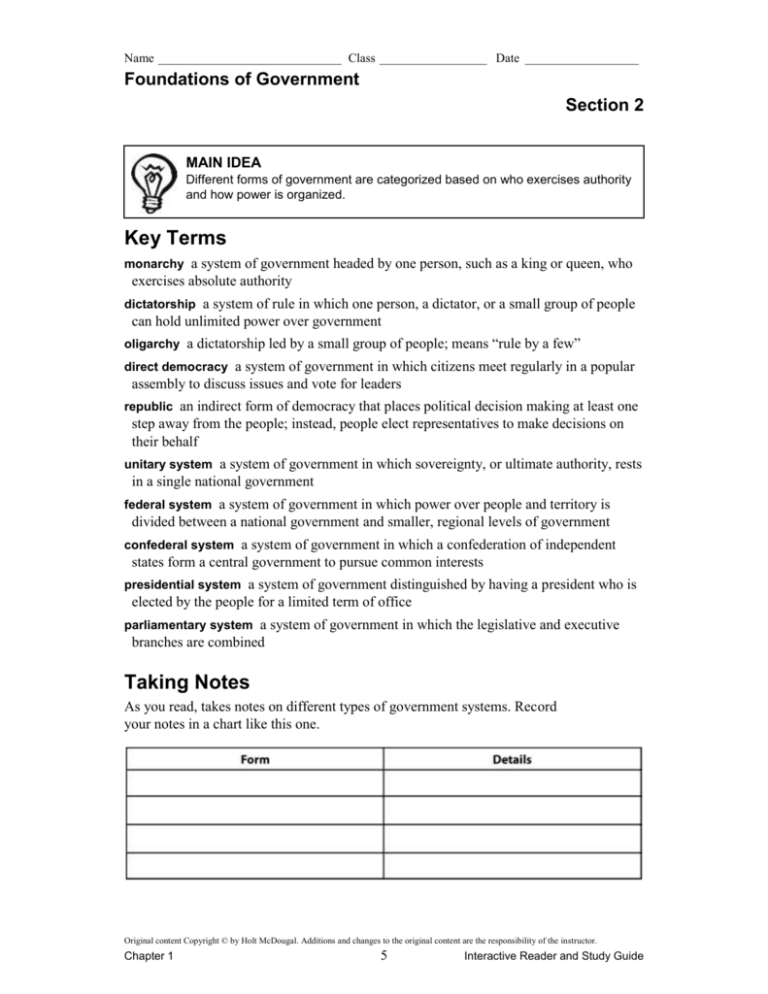
Name _____________________________ Class _________________ Date __________________ Foundations of Government Section 2 MAIN IDEA Different forms of government are categorized based on who exercises authority and how power is organized. Key Terms monarchy a system of government headed by one person, such as a king or queen, who exercises absolute authority dictatorship a system of rule in which one person, a dictator, or a small group of people can hold unlimited power over government oligarchy a dictatorship led by a small group of people; means “rule by a few” direct democracy a system of government in which citizens meet regularly in a popular assembly to discuss issues and vote for leaders republic an indirect form of democracy that places political decision making at least one step away from the people; instead, people elect representatives to make decisions on their behalf unitary system a system of government in which sovereignty, or ultimate authority, rests in a single national government federal system a system of government in which power over people and territory is divided between a national government and smaller, regional levels of government confederal system a system of government in which a confederation of independent states form a central government to pursue common interests presidential system a system of government distinguished by having a president who is elected by the people for a limited term of office parliamentary system a system of government in which the legislative and executive branches are combined Taking Notes As you read, takes notes on different types of government systems. Record your notes in a chart like this one. Original content Copyright © by Holt McDougal. Additions and changes to the original content are the responsibility of the instructor. Chapter 1 5 Interactive Reader and Study Guide Name _____________________________ Class _________________ Date __________________ Section 2 continued Section Summary THE CLASSIC FORMS The most common form of government in world history has been the monarchy, a system of government headed by one person who inherits power, such as a king or queen. In an absolute monarchy, the monarch’s power is unlimited, but in the more common constitutional monarchy, the monarch is a ceremonial figure, less powerful than other parts of the government. In a dictatorship, one person—called a dictator— or a group of people—called an oligarchy—hold unlimited power over government. The strength of dictators, who have usually taken over the former government by force, varies. Some are independent of religion; others, called theocracies, are linked closely to religion. The most powerful are totalitarian governments, which attempt to dominate all aspects of society, including religion and the economy. Democracy, literally meaning “rule by the people,” is a much different form of government. In a direct democracy, citizens meet regularly to discuss and address issues and vote directly for leaders. Since this system is hard to accomplish in large nations, many countries, including the United States, choose to be republics (sometimes called representative democracies). In a republic, the people elect representatives to make decisions for them. Is a monarch more powerful in a constitutional monarchy or an absolute monarchy? _______________________ _______________________ What is the difference between a direct democracy and a republic? _______________________ _______________________ _______________________ ORGANIZING NATIONAL POWER There are a variety of ways in which countries govern their smaller administrative units, such as states, cities, and provinces. Most countries employ the unitary system, through which ultimate authority, or sovereignty, rests in a single national government. While local governments can still exist in the unitary system, the national government can overrule their decisions and even abolish them completely. In a federal system, invented by the Framers of the U.S. Constitution, power over people and land is divided between the national government and regional levels of government, such as state governments. Unlike a unitary system, in a federal system neither Original content Copyright © by Holt McDougal. Additions and changes to the original content are the responsibility of the instructor. Chapter 1 6 Interactive Reader and Study Guide Name _____________________________ Class _________________ Date __________________ Section 2 continued level of government can abolish the other nor can each operate completely independently of the other. The third organizational form of national power, the confederal system, is uncommon today. Under this system, independent states govern their own people and land while still maintaining a weak central government. This central government is only responsible for functions important to the group of states, or confederation, such as defense and trade. What is the difference between regional levels of government in a federal system and those in a confederal system? _______________________ _______________________ _______________________ PRESIDENTS AND PARLIAMENTS Democracies, though they can vary somewhat in structure, follow either a presidential political system or a parliamentary political system. The United States’ government is an example of a presidential system. In this system, besides acting as the head of state, the president is also the head of the executive branch. His or her duties as chief executive range from setting foreign policy to appointing cabinet members to introducing legislation. Since the U.S. government structure includes separation of powers, the president’s authority is balanced by the way the legislature can check his or her actions. The president and Congress must work together to make sure the daily business of government gets done. Unfortunately, this system of divided government can sometimes result in political gridlock; when the president and Congress disagree, the political process can come to a halt. Gridlock is less of a problem in parliamentary systems since the executive and legislative branches are one entity. Members of the legislature, called parliament, are elected by the people. These officials in turn choose the prime minister, who is both the head of state and the leader of the majority party in parliament. If the prime minister loses support of his or her party, he or she must resign, at which points parliament chooses another head of state. Critics of the parliamentary system feel that it is wrong that the voting public cannot directly elect a prime minister and that the prime minister is too much under the control of parliament. But supporters believe that it is easier to pass laws in this kind of united system than in the presidential system. Why is gridlock less of a problem in parliamentary systems? _______________________ _______________________ _______________________ Original content Copyright © by Holt McDougal. Additions and changes to the original content are the responsibility of the instructor. Chapter 1 7 Interactive Reader and Study Guide
